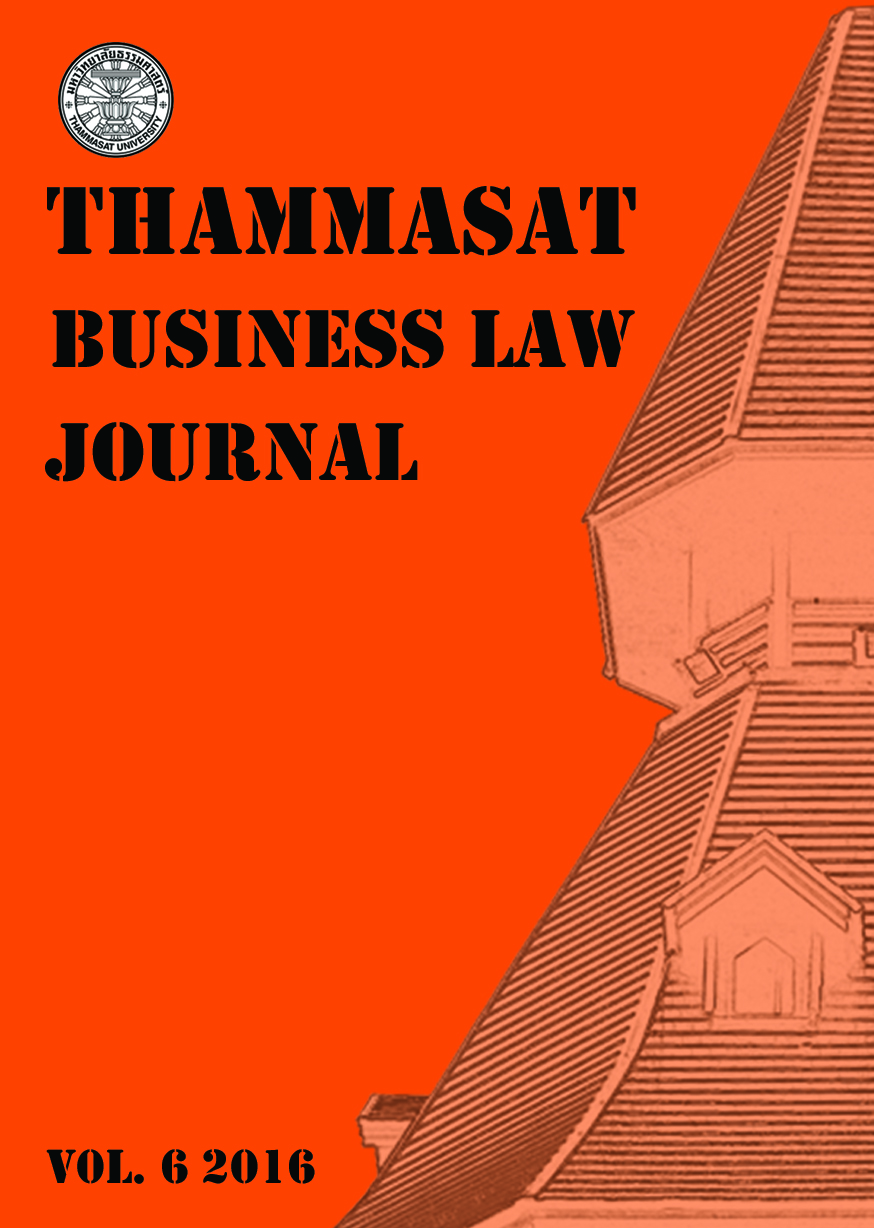LEGAL MECHANISMS FOR CONSUMER PROTECTION IN SWEEPSTAKES PROMOTION
Main Article Content
Abstract
Sales promotion is a marketing strategy that is designed to entice customers to purchase goods or services. Sweepstakes promotion is a form of sales promotions which attract consumers by offering them the chance to win valuable prizes. The most common example of sweepstakes in Thailand is the competition of two drink green tea businesses by launching sweepstakes campaigns in which maybe affects the consumers’ decision. Furthermore, some traders misrepresent the likelihood of actually winning through the sophisticated use of graphics which manipulates type size and text to hide the conditions. As a matter of fact, the traders do not have the intention of giving away the prizes.
As a result, a legal issue has been raised about the characteristics of sweepstakes, how businesses benefit from their use and the legal mechanisms to control sweepstakes promotion including whether the consumers’ right to claim remedies for financial loss in illegitimate sweepstakes promotion.
Considering foreign laws regarding consumer protection, namely European Union, United Kingdom and Japan, there are specific legislation on consumer protection in sweepstakes promotion. The European Union (“EU”) imposed the Directive 2005/29/EC on Unfair Commercial Practices. The UCPD stated a specific concept of false prize winning including claiming to offer prize promotion without awarding the prizes described, which aims to prohibit unfair commercial activity. The United Kingdom has the Consumer Protection from Unfair Trading Regulations 2008 (“CPRs”) implemented the Unfair Commercial Practices Directive. While Japan, the Fair Trade Commission enacted the Act against Unjustifiable Premiums and Misleading Representations (“AAUPMR”).
Since Thailand is also currently facing the problem in consumer protection in sweepstakes promotion, therefore, this study will explore and compare Thai Law along with foreign Laws which mentioned earlier. Sweepstakes promotion can be controlled in Thai Civil and Commercial Code (the CCC) and Consumer Protection Act (the CPA). However, there are some obstacles or limitation to the application of sweepstakes promotion since Civil and Commercial Code (the CCC) mostly focuses on protecting individual consumers who has rights to claim the remedy according to the contract law or promises but not every sales promotion is applicable to the CCC. While the study of Consumer Protection Act (the CPA) found that the CPA may not cover the marketing strategies such as sweepstakes promotion.
Thus, the author will explore the downfall of the Consumer Protection Act B.E.2522 in order to achieve the suitable recommendation for the amendment of the Act regarding legal measures to control sweepstakes promotion and legal measures on consumers’ right to claim the remedy as following;
- legal measure to control sweepstakes promotion
The author suggests imposing the important of the principles of sweepstakes promotion in consideration of forbidding the misleading and obscure sweepstakes promotion. According to the Consumer Protection Act B.E.2522, the Committee of Advertising and Sales Promotion was established and assigned the power to enforce legal measures to control sweepstakes promotion by changing the committee of advertising to the committee of advertising and sales promotion. The said legal measures are pre-market control and post-market control. Pre-market control requires the traders to report the suspicious illegitimate sweepstakes promotion to the Committee of Advertising and Sales Promotion whereas post-market control is imposed by the Committee of Advertising and Sales Promotion to prohibit the traders who infringe the law.
- legal measure on right to claim the remedy the consumer
The author suggests that the right to terminate the contract must be conveyed to the consumers so the consumers acknowledge their right and able to exercise the right according to the law.
Article Details
References
สษุม ศุภนิตย์คำอธิบายกฎหมายเกี่ยวกับคำโฆษณา.กรุงเทพฯ: นิติบรรณา, 2543.(Susom Supanit. Law on Adevertising. Bangkok: Niti Bannakarn, 2000.)
ไพโรจน์ อาจรักษา.กฎหมายคุ้มคองผู้บริโภค ฉบับชาวบ้าน. กรุงเทพฯ: วิญญูชน, 2543. (Pairot Agruksa. Consumer Protection Law (People Version). Bangkok: Winyochon, 2002.)
David Clifton & Suzanne Davies, Clifton Davies Consultancy Limited. “Sales promotions. Prize draws and Competitions: gambling law issues.” http://cliftondavies.com/wp-content/uploads/2013/12/Sales-promotions-prize-draws-and-competitions-gambling-law-issues-November-2013.pdf
JosetteGrech. “Sweepstakes, prize draws and competitions.”http://www.timesofmalta.com/articles/view/20150527/business-news/sweepstakes-prize-draws-and-competitions.569880 (accessed November 3, 2015)
Andy Butcher, Paul Jordan, Sacha Wilson. “Advertising Law commodity derivatives, United Kingdom.” http://www.globelawandbusiness.com/IAL/sample.pdf
The Office of Fair Trading. “The Consumer Protection from Unfair Trading Regulations:a basic guide for business.” https://www.gov.uk/government/uploads/system/uploads/attachment_data/file/284446/oft979.pdf
Comparative consumer law. “Japanese consumer law” (May 2010), https://tmuramot.wordpress.com/confusion-of-the-concept-between-fiduciary-duty-and-suitability-rule/


